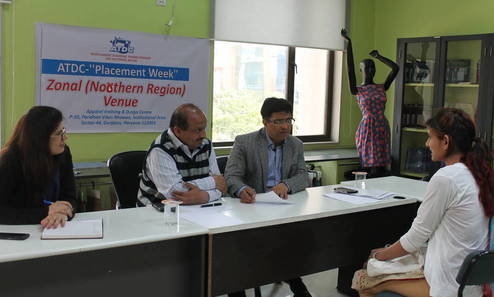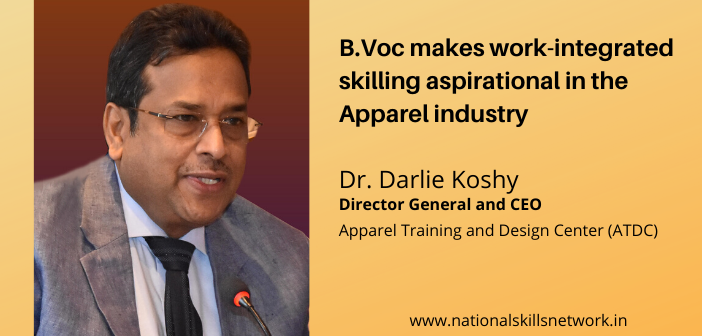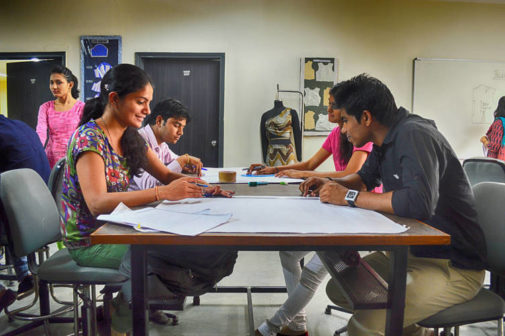ATDC has been a trend setter by offering of B.Voc degree in the Apparel industry, catering to the knowledge and skills of the professionals. In this Skill Talk, Dr. Darlie Koshy, Director General and CEO, Apparel Training and Design Center (ATDC), takes us through the journey of how it has evolved as an aspirational degree for fashion and fabric enthusiasts. Let’s read on to learn more about why such courses should be offered across industries to make skilling aspirational for youth in India.
Q: How do we build the larger context for offering the B.Voc courses? Can you share the apparel industry perspective?
 A: For basic skilling, through Integrated Skill Development Scheme (ISDS), many youth are getting trained in entry-level skills in the apparel industry. In places like Sikkim, Manipur and Thiruvananthapuram, I have seen even Graduates, Post Graduates attending the ISDS Program for Sewing Machine Operator in order to take up Entrepreneurship so a Program like B. Voc which offers an entrepreneurship track addresses this aspiration of youth.
A: For basic skilling, through Integrated Skill Development Scheme (ISDS), many youth are getting trained in entry-level skills in the apparel industry. In places like Sikkim, Manipur and Thiruvananthapuram, I have seen even Graduates, Post Graduates attending the ISDS Program for Sewing Machine Operator in order to take up Entrepreneurship so a Program like B. Voc which offers an entrepreneurship track addresses this aspiration of youth.
So, this goes to show that people who are getting generic degrees are not employable. Or, they desire to do something they like, which, the regular degree courses do not provide an option. For example, the desire to be in the interesting world of fashion and apparel which will engage them throughout their life. Fashion is a very exciting field because no season is the same as the last season, like the garments changing on every ramp. This is definitely aspirational for many youth. However they need to have a solid starting point. And, if you look at the government-funded, free-of-cost short-term skilling, such students may get disappointed soon, because it is very short to help them realize their potential. Hence, it may not sustain their interest.
Q: Please tell us about the B.Voc courses offered by ATDC
A: The B.Voc program fills in that aspirational gap. It changes the job perception from a Sewing Machine Operator (SMO) to a Fashion Designer or a Fashion Merchandizer. We introduced 2 tracks in 2015: B.Voc in Apparel Manufacturing and Entrepreneurship and B.Voc in Fashion Design and Retail. https://atdcindia.co.in/academicprograme/degree-program-bvoc/
These tracks were attractive, because, instead of a 4-year program like B.Des, here, in 3 years, you get 2000 hours of deep-dive technical skills, and 1000 hours of general inputs in Maths, Statistics, Communication, Soft Skills and Life skills. This provides a holistic combination of education and on-the-job training, apart from industry visits and exposure through internships. B.Voc fills in the lacunae of having a generic degree in Arts, Science or Commerce that, currently does not prepare them for the world of work or a job role.
Earlier, our philosophy was ‘learn to learn’, ‘learn to do’ and ‘learn to know’. But, considering today’s employment scenario, you need to rephrase it as ‘learn to learn’ and ‘learn to earn’. You must be continuously learning to learn to meet the dynamic needs of the industry. In a life time, of about 30 to 40 years of active work life, you may need at least 5 or 6 jobs for a fulfilling career!
Q: How is the industry integrated curriculum leading attracting the students?
A: I’m glad to say that the B.Voc program is attracting different type of students. I meet people in 22 centres offering B.Voc; it’s heartening to see their interest in local crafts, taking up projects in life style products, and 2 of the students are managing our smart shoppe they are so keen to build customer base.
This degree is the mainstreaming of vocational education in its truest form and I believe that apparel sector offers the largest employment potential for India since as of now only 43 USD for capita is the expenditure on garments which can go up to 125-150 USD easily by 2025 And, unlike few other professions that necessitate working outdoors, in the apparel industry, most production happens inside the factories that are climate controlled.
 Recently, one of our B.Voc students got placed for Rs. 28000 per month salary + Rs. 15000 allowances in Kannur. Most of the graduates will be earning Rs.20000 to Rs. 28000 including benefits which is otherwise good for someone who would have started at Rs. 12000 to Rs. 15000 per month. Being online, fashion has become more live and instantaneous. There are new options for placements in e-commerce. B.Voc degree holders can work as backend product analysts and come up with innovative ways to sell the products by understanding customers tastes and keep them engaged. The B.Voc curriculum equips them with industry and product knowledge to explore such careers. These students can fits into a role that needs a mix of knowledge and skills in demand aggregation, analysis, answering customer queries and so on.
Recently, one of our B.Voc students got placed for Rs. 28000 per month salary + Rs. 15000 allowances in Kannur. Most of the graduates will be earning Rs.20000 to Rs. 28000 including benefits which is otherwise good for someone who would have started at Rs. 12000 to Rs. 15000 per month. Being online, fashion has become more live and instantaneous. There are new options for placements in e-commerce. B.Voc degree holders can work as backend product analysts and come up with innovative ways to sell the products by understanding customers tastes and keep them engaged. The B.Voc curriculum equips them with industry and product knowledge to explore such careers. These students can fits into a role that needs a mix of knowledge and skills in demand aggregation, analysis, answering customer queries and so on.
Q: What is the roadmap and vision for vocational degrees like B.Voc and M.Voc in the apparel industry?
 A: This is a fantastic opportunity to scale up B.Voc in country, fitting into startup ecosystem emerging in the country, as well as for the domestic market – both e-commerce and omnichannels – these students are a perfect combination of technical skills and manufacturing merchandising understanding to be working in large numbers. We are planning to introduce M.Voc in collaboration with RGNIYD; it is yet to be finalised.
A: This is a fantastic opportunity to scale up B.Voc in country, fitting into startup ecosystem emerging in the country, as well as for the domestic market – both e-commerce and omnichannels – these students are a perfect combination of technical skills and manufacturing merchandising understanding to be working in large numbers. We are planning to introduce M.Voc in collaboration with RGNIYD; it is yet to be finalised.
Since RGNIYD is associated with the Ministry of Youth Affairs and it is of national importance, it provides mobility to the students. It’s a great opportunity for the industry led organization like ATDC that translated industry demands in curriculum and we can do a much bigger task for the country as we are dedicated to provide long-term, comprehensive and sustainable solutions.
Q: Please share your insights on curriculum, technology and entrepreneurship in connection with industry-integrated higher education in this industry.
A: The challenge is to dynamically update the curriculum, the Qualification Packs (QPs) and National Occupational Standards (NOS) being in close interaction with the industry. Perhaps, a visit to factories in Cambodia, Vietnam and Bangladesh will show how cutting-edge technologies are being used to improve speed, quality and productivity. We need to continuously get inputs from global fashion and invest in latest technologies. For example, the use of 3D printing in garment design should reflect in the curriculum.
Professionals have to move from skills to competencies in a context. Skill is only generic the moment skill is applied into the context of a company and answer challenges it becomes a competency. Your competency in an environment can be proved, if your technological environment is familiar to you. We need to build a system to enable this.
Entrepreneurship is the future in India. With over 16 to 17 million likely to join the labour force every year, actual jobs created in organized sector is for 2 to 3 million. Apparel industry has a huge potential to absorb people from informal sector as well.
Entrepreneurship has greater scope because larger companies are willing to take them under open innovation system. Startups can take up things like taking measurements at homes and company delivers the garments, they are paid well, so opportunities are there for full time and part time employment, only this is we need to remove the fear of failure and fear of risk, government should provide real support for incubation, there is no proper fashion incubation even after 30 years of NIFT access to incubation fund.













Comments 6